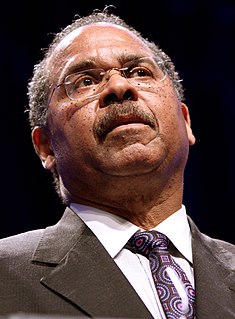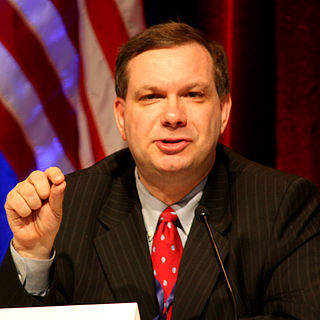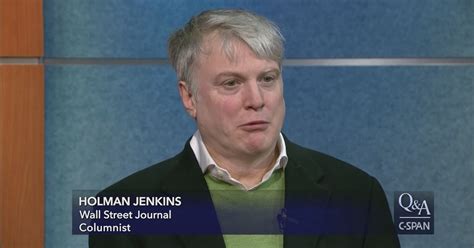Top 1180 Sector Quotes & Sayings - Page 19
Explore popular Sector quotes.
Last updated on April 22, 2025.
The left has done a very admirably good job of demonizing the private sector, where what happens? Cheating, lying, dishonesty, destroying the planet, killing customers, starving people. And they've positioned themselves, of course, as the great compassionate last hope. They're the ones who truly care. We're not supposed to examine the results of their efforts, which are always dismal and always fail. We're supposed to examine their good intentions.
Economic control is not merely control of a sector of human life which can be separated from the rest; it is the control of the means for all our ends. And whoever has sole control of the means must also determine which ends are to be served, which values are to be rates higher and which lower, in short, what men should believe and strive for.
New investments in cyber security and the modernization of our military will spur substantial new job creation in the private sector and help create the jobs and technologies of tomorrow. It's what we have to do. America must be the world's dominant technological powerhouse of the twenty-first century, and young Americans - including in our inner cities - should get these new jobs!
Women have an important role in agriculture. We need to introduce technology, which will help us harness the potential of women in agriculture. We need to divide the agriculture sector into three parts- regular farming, farming of trees and animal husbandry. If we are able to do this, the contribution of our women will increase even more.
I would cap the amount of federal government can spend at 20 percent of the economy. Bring it back to 20 percent or lower. And say, we are not going to spend above that level. Democrats, they want to raise your taxes and spend more and more and turn us into an economy which is no longer driven by the private sector.
Private sector labor market flows provide additional indications of the strength of the labor market. For example, the quits rate has tended to be pro-cyclical, since more workers voluntarily quit their jobs when they are more confident about their ability to find new ones and when firms are competing more actively for new hires.
You can look at any industry and sector and then figure out how high is your glass ceiling. Do you want to diversify or do you want to penetrate the ceiling? Because the ones who break the glass ceiling are going to be big-time winners, but it will be a longer-term view on things and requires a lot more courage, a lot more guts.
World Health Day is an opportunity to highlight the problem, but above all, to stimulate action. It is an occasion to call on all partners - governments, international donors, civil society, the private sector, the media, families and individuals alike - to develop sustainable activities for the survival, health and well-being of mothers and children. On this World Health Day, let us rededicate ourselves to that mission.
The bad consequences of a government program usually don't show up immediately. And the delay may be long enough to hide the connection between the program and its results. So government never has to say it's sorry - never has to take responsibility for ht misery it causes. Instead it can blame everything on personal greed, profit-hungry corporations, and the 'private sector.' And the government's cure for the problems is to impose bigger programs, more regulation and higher taxes.
The manufacturing industry is starting to press for some kind of national healthcare. Now it's beginning to put it on the agenda. It doesn't matter if the population wants it. What 90% of the population wants would be kind of irrelevant. But if part of the concentration of corporate capital that basically runs the country - another thing we're not allowed to say but it's obvious - if part of that sector becomes in favor then the issue moves onto the political agenda.
When we conducted focus group interviews in the first municipality in Brazil before initiating the pilot project, a woman commented: Getting an appointment in the public sector municipal health services is like "winning the lottery." I would like to make it possible for many women and men in Latin America to win the lottery and receive the type of reproductive health services they so urgently need.
Since the government creates no wealth, it can only transfer the wealth required to hire people. Even if the government creates a million jobs, that is not a net increase in jobs, when the money that pays for those jobs is taken from the private sector, which loses that much ability to create private jobs.
When people abuse these freedoms to enrich themselves at the expense of others, then the public will demand the government to step in. That is how government grows, and how freedom is diminished.... When financial meltdowns occur, the public's outrage drives government to take over part of the private sector. When the government does so, it replaces irresponsible executives with unaccountable bureaucrats. That takes us out of the frying pan and into the fire.
The camera can push the new medium to its limits - and beyond. It is there - in the "beyond" - that the imaginative photographer will compete with the imaginative painter. Painting must return to the natural world from time to time for renewal of the artistic vision. The key sector of renewal of vision today is the new vistas revealed by science. Here photography, which is not only art but science also, stands on the firmest ground.
What do intellectuals and opinion makers get from big government? An increasing number of cushy jobs in the bureaucracy, or in the government-subsidized sector, staffing the welfare regulatory state, and apologizing for its policies, as well as propagandizing for them among the public. To put it bluntly, intellectuals, theorists, pundits, media elites, etc. get to live a life which they could not attain on the free market, but which they can gain at taxpayer expense.
In the economy we guarantee all market players the same conditions, and the private sector plays an increasingly important role. We are in the process of dissolving thousands of state-owned companies and converting them into stock corporations. We even plan to accelerate this development. In contrast, it is the party's responsibility to improve the lives of the people, and this is where our citizens have great confidence in us. Party members who commit crimes are severely punished.
I don't have support. Not me ; all Syria. Every agreement is between every class and every sector in Syria ; government, people, trade, military, culture, everything ; it's like the cooperation between your country and any other country in the world. It's the same cooperation. It's not about me ; it's not support for the crisis.
Here is a principle to use in all aspects of economics and policy. When you find a good or service that is in huge demand but the supply is so limited to the point that the price goes up and up, look for the regulation that is causing it. This applies regardless of the sector, whether transportation, gas, education, food, beer, or daycare. There is something in the way that is preventing the market from working as it should. If you look carefully enough, you will find the hand of the state making the mess in question.
I guess the main thing that came out of the Panama Papers was that Ukrainian President Poroshenko had promised to divest of his chocolate company and instead, he simply moved it into an offshore account. And on the very day that he was increasing the attacks on the eastern Donbass region of Ukraine, the export sector, he was signing documents to conceal his own money offshore. So the exposé of the Panama money laundering has hit some of the dictators that America is protecting and promoting.
These new investments in cyber security and the modernization of our military will spur substantial new job creation in the private sector and help create the jobs and technologies of tomorrow. It's what we have to do. America must be the world's dominant technological powerhouse of the twenty-first century, and young Americans - including in our inner cities - should get these new jobs!
Many state governments have launched innovative steps such as Ladli Laxmi scheme of Madhya Pradesh, PDS reform scheme of Chattisgarh, computerization of land records in Karnataka, free computers to students passing 10th standard exams, pollution control efforts in Himachal, power sector reforms in Rajasthan and Mumbai - Pune Expressway in Maharashta. These excellent innovative schemes are examples of good governance.
Much of America is now in need of an equivalent of Mrs. Thatcher's privatization program in 1980s Britain, or post-Soviet Eastern Europe's economic liberalization in the early Nineties. It's hard to close down government bodies, but it should be possible to sell them off. And a side benefit to outsourcing the Bureau of Government Agencies and the Agency of Government Bureaus is that you'd also be privatizing public-sector unions, which are the biggest and most direct assault on freedom, civic integrity, and fiscal solvency.
When you've got a economy in which 40 percent of economic growth is happening in the financial sector, that turns out that was all an illusion, that it wasn't growth based on real products and services, but just a bunch of paper shuffling and a house of cards, then what's gonna emerge, at some point, is a sense of resentment, a sense that the system's rigged, and it's not working for ordinary people. And it's not fulfilling the basic American dream.
Silicon Valley, after all, feeds off the existence of computers, the internet, the IT systems, satellites, the whole of micro electronics and so on, but a lot of that comes straight out of the state sector of the economy. Silicon Valley developed, but they expanded and turned it into commercial products and so on, but the innovation is on the basis of fundamental technological development that took places in places like this [MIT] on government funding, and that continues.
We are all assumed, these days, to reside at one extreme of the opinion spectrum, or another. We are pro-abortion or anti-abortion. We are free traders or protectionists. We are pro-private sector or pro-government. We are feminists or chauvinists. But in the real world, few of us hold these extreme views. There is instead a spectrum of opinion.
Tom Coburn never forgot that members of Congress are spending the hard-earned money of the people back home. Even a lot of conservatives end up forgetting that. Here's hoping that back in the private sector, Tom Coburn keeps up the fight for his beliefs and that he remains a constant reminder to lawmakers and the White House of ethical standards to which all should aspire.
I believe a great company, whether improving a sector or creating a new one, needs to have an excellent product or service at its core; needs strong management to execute the plan and a good brand to give it the edge over its competitors. Providing quality service, combined with value for money and in an innovative way ensures you offer real value - and finally to be responsible to society and the planet.
This is something that Randi Weingarten said to me when I interviewed her once, which I think I quote in chapter nine. She talks about how only 7 percent of private sector workers in the American economy are in unions. So all the protections that teachers have that are due to collective bargaining - including generous pensions, generous health plans, limits to what they can be asked to do after school and in the summers - all of those things are sources of resentment to the public. And I think that politicians have played off of that quite effectively.
Cuts in a sector are never going to be welcomed, and arts funding cut by up to 30% doesn't make nice reading. But cuts are happening across the board, in many sectors for the sake of the economy. And if you look at economically depressed post-war UK, The Beatles, The Who and The Rolling Stones came into fruition... maybe giving weight to the claim that bad economic times can actually lead to greater creativity!
I address you with neither rancor nor bitterness in the fading twilight of life, with but one purpose in mind: to serve my country. The issues are global and so interlocked that to consider the problems of one sector, oblivious to those of another, is but to court disaster for the whole. While Asia is commonly referred to as the Gateway to Europe, it is no less true that Europe is the Gateway to Asia, and the broad influence of the one cannot fail to have its impact upon the other.
f the government is going to put money into the automobile sector, it should break up GM and Chrysler as a condition of financial aid, and it should be even-handed in its treatment of start-up firms like Tesla, Miles, Fisker, and others. It would be terrible to kill the entrepreneurs who have taken great risks to bring new automotive technologies to market by pumping tax dollars into the behemoths that have done everything wrong for the last years.
Twenty million jobs is what we call for in the Green New Deal, which is essentially a New Deal focused on greening the economy on an emergency basis. So it's 20 million jobs, which are mixed, private sector, nonprofits, government jobs where others will not do the job and will not create the employment.
So outside agriculture, in manufacturing and services, we must create a lot more jobs. But that also means that we must ensure that our systems of general education and technical education are in line with the job requirements that a more modern manufacturing and a more modern services sector would require.
Americans believe that the private sector is always more efficient and cheaper than big government, and particularly when you go among Republicans, even after five beers, they still believe it. But I always say, "If it's really true, why would they need that 12 percent extra on a traditional government program? Explain to me why something that costs more saves me money as a taxpayer.".
The socialism of centralised state control of industry and production, is dead. It misunderstood the nature and development of a modern market economy. It failed to recognise that the state and public sector can become a vested interest capable of oppression as much as the vested interests of wealth and capital. it was based on a false view of class that became too rigid to explain or illuminate the nature of class division today.
We have to accept that capitalism is coming to an end. We can't provide paid employment for people, all the industries with technology are counter-intuitive to profit, and we have to have a transition to the conceptualist society. The only way to do it fairly is as a social democracy, a radical social democracy, which isn't compromised by neo-liberalism and isn't compromised by the rich, and isn't compromised by hegemonic, authoritarian interests: to have that balance between the government, the private sector, and then the individual citizens again.
I don't think I'm saying anything wrong. And that's just how I judge it. I believe it's not so much about the people, that's just my take. I think making it about people is the wrong way to do it. I think it's the systems. The systems are broken; the systems are what need to be fixed. I think there's bad people in every sector of America.
My advice is if we can't replace Obamacare by ourselves, to go to the Democrats and say this. 10% of the sick people in this country drive 90 percent of the cost for all of us. Let's take those 10 percent of really sick people, put them in a federal managed care system so they'll get better outcomes, and save the private sector market if we can't do this by ourselves. That's a good place to start.
There's no question that in my lifetime, the contrast between what I called private affluence and public squalor has become very much greater. What do we worry about? We worry about our schools. We worry about our public recreational facilities. We worry about our law enforcement and our public housing. All of the things that bear upon our standard of living are in the public sector.
Today the strategies of many companies in the real estate industry are premised on low interest rates, an assumption that has resulted in the rapid expansion of the real estate securitization business. This trend could be regarded as a risk factor, as it exposes the real estate sector to at least three potential problems: first, interest rate hikes; second, revisions to securitization business accounting standards; and third, overheating in the real estate market.
As a great democratic society, we have a special responsibility to the arts. For art is the great democrat, calling forth creative genius from every sector of society, disregarding race or religion or wealth or color. What freedom alone can bring is the liberation of the human mind and a spirit which finds its greatest flowering in the free society. I see of little more importance to the future of our country and our civilization than the full recognition of the place of the artist.
What we're going to do with cyber-attacks - and we have already actually started - we started well before the executive order actually was issued - is working with the private sector, determine how best to share information, because, you know, we can't help until we know that there has actually been an attempted intrusion or attack. Information-sharing piece is very important.
Bankers themselves govern the Fed to some extent, and then there's the classic revolving door where Fed officials come from and then go back to the financial sector. Fed officials tend to believe that the institution should have a large measure of independence from democratic control, even though in law it is under the ostensible control of Congress.
They [leaders in Western Europe] do not misuse financial instruments, financial injections, but, first of all, seek structural change. This is urgent for our economy as well, maybe even more urgent bearing in mind the problem that we cannot yet deal with, namely the prevalence of the oil and gas sector in the Russian Federation and, as a result, dependence on revenue from oil and gas.
What is called music today is all too often only a disguise for the monologue of power. However, and this is the supreme irony of it all, never before have musicians tried so hard to communicate with their audience, and never before has that communication been so deceiving. Music now seems hardly more than a somewhat clumsy excuse for the self-glorification of musicians and the growth of a new industrial sector.
No one in this country need go hungry, and alleviating the problem is primarily a matter of readjusting our priorities. In both the government and the private sector, self-interest has displaced the ideal of community that made this country great. The old world view of "us, we, our" has been replaced by "I, me, mine." The reasons for this are manifold and complex, but at the end of the day, we need to remember that, if one of us is suffering needlessly, all of us are diminished.
There's a great debate going on, you know, on whether we're moving toward a system of giant oligopolies or a system of multiples of small businesses. Which is it? I think it's both. In every sector of the economy, we have giant brands that are trustworthy guides to what's good, and then a vast number of small groups, many of them project-based, sometimes folding and re-creating, that are offering products and services through those giant global brands.
The Republican Party has pretty much abandoned any pretense of being a traditional political party. It's in lockstep obedience to the very rich, the super rich and the corporate sector. They can't get votes that way so they have to mobilize a different constituency. It's always been there, but it's rarely been mobilized politically. They call it the religious right, but basically it's the extreme religious population.
When you bring in multi-brand retail items into the country, you're not just bringing the products, but you're also harming local manufacturers. You must strengthen your manufacturing sector and put it on a level playing field with the world. Any kind of items manufactured globally, like small pens, pencils, notebooks - our manufactured goods need to be on a level playing field. Then let them come. Have a competition.
Well that's a bit of a question like saying, what have you learned in life that would help you lead? My whole life has been learning to lead, from my parents, to my education, to the experience I had in the private sector, to helping run the Olympics, and then of course helping guide a state. Those experiences in totality have given me an understanding of how America works and how the economy works.
In less than a year Revolution has gone from being a concept to a reality, with three rapidly growing sector companies, overseeing a dozen acquired firms that collectively employ more than 2,500 people. But we're just scratching the surface in terms of the potential to build Revolution into a new kind of company that gives consumers more choice, control and convenience in the important aspects of their lives.
The loan crisis and the increasing slashing of funds for students, coupled with the astronomical rise in tuition, represent an unparalleled attack on the social state. The hidden agenda here is that when students graduate with such high debts, they rarely choose a career in public service; instead, they are forced to go into the corporate sector, and I see these conditions, in some ways, as being very calculated and as part of a larger political strategy to disempower students.
A higher IOER rate encourages banks to raise the interest rates they charge, putting upward pressure on market interest rates regardless of the level of reserves in the banking sector. While adjusting the IOER rate is an effective way to move market interest rates when reserves are plentiful, federal funds have generally traded below this rate.
I think it's hard sometimes for people to grapple with the real-life consequences of political change. I think that, we as a culture, feel like politics is one sector of our lives that can feel apart from our personal lives and the cultural things we're interested in and the sports we watch. It feels like this separate, different thing.
The key problem is to find out why that sector of society of the past, which I would not hesitate to call capitalist, should have lived as if in a bell jar, cut off from the rest; why was it not able to expand and conquer the whole of society?... [Why was it that] a significant rate of capital formation was possible only in certain sectors and not in the whole market economy of the time?
Will customers keep supporting the enormous overhead required to sustain ineffectual, unproductive stock picking across an array of thousands of individual funds devoted to every investing 'style' and economic sector or regional subgroup that some marketing idiot can dream up? Not likely. A brutal shakeout is coming and one of its revelations will be that stock picking is a grossly overrated piece of the puzzle, that cost control is what distinguishes a competitive firm from an uncompetitive one.
The people of Ontario have a right to know how their dollars are being spent. Ontario has the leanest government in Canada while still providing high-quality public services that people can rely on. Today, we are releasing the 2014 Public Sector Salary Disclosure list as part of our government's commitment to be the most open and transparent government in the country.
I actually do not believe that Trump is anti-trade as such. He himself was a life-long trader in his own area, the real estate sector. And hasn't he just closed an arms deal with the Saudis valuing over $100 billion? The difference is that Trump sees trade as something with a winner and a loser. This seems to be a theme of his, and that makes us different. For us, trade is something where both sides win.




















































